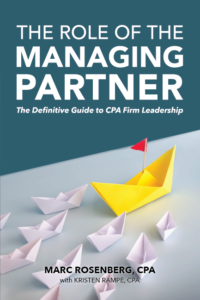Critical Insights from a Top 100 Firm Managing Partner
![]() Marc Rosenberg, CPA / Apr 18, 2022
Marc Rosenberg, CPA / Apr 18, 2022
Our Chicago large firm roundtable has brought in premier MPs from across the country for 15 years to share with us their management practices. Our most recent visitor was Steve Wasserman, MP of Los Angeles-based Gursey Schneider. GS ranks as #96 on Accounting Today’s Top 100 list, with revenue of $51M, 7 equity partners, 9 non-equity partners and 221 total personnel. Their focus is media and entertainment, high net worth individuals, family law, litigation and business management. Though we can’t divulge confidential data, trust me when I say that their profitability is outstanding. Here is what we learned from Wasserman’s visit.
- Managing Partner role. Wasserman sees himself as a consensus builder. He gets buy-in from his partners before formal votes. After a few years as MP, Steve realized he has to make key decisions even knowing he won’t please everyone.
- Administration and operations. They have on board a high-level Director of Operations.
- Recruiting. To solve their staff shortage problem, in recent years they have hired roughly 50 people from around the country who work remotely. Another bonus of this: the firm doesn’t have to pay them L.A. salaries. They opened four satellite offices, a decision driven by employees’ desire to avoid driving to downtown L.A., and attorneys’ requests to have more geographic coverage for serving clients.
- Partner comp system. Main factors are business origination, size of client base, billable hours, and intangibles. They have a three-person comp committee comprising the MP and two equity partners. They create an intangibles pool of money that accumulates from unallocated profits due to partner retirements and profits from business brought in by non-partners. The MP receives a management stipend; it’s set by the MP and always gets accepted.
The Role of the Managing Partner is the only CPA-firm-specific resource for MP success. The book addresses ► how the MP manages partners ► how a good MP impacts profitability ► the MP’s role in managing staff ► how MPs enforce the partner agreement ► essential organizational skills for MPs ► the MP’s job description ► how MPs should be evaluated.
- Partner deferred compensation plan. It’s 2.5 times the average comp of a partner for their last four years, payable over 10 years. The vesting period is 20 years. A smaller payout level is provided to non-equity partners. GS decided to exclude income attributable to unused PPP loans from deferred compensation computations. The firm has a mandatory retirement provision at age 70. They like this because many of their partners approaching normal retirement ages were unable to retain partner-level skills. If a partner continues to be productive at age 70 and wants to continue working, a consulting agreement is granted, one year at a time, subject to a vote of the partners.
- Capital accounts. All equity partners have equal capital accounts.
- Promoting non-equity partners to equity. Each NE partner makes a five-minute pitch to the equity partners on their performance. Then, the equity partners each present to the other equity partners their recommendations, and an average is determined. Then a formal vote is taken.
- Dealing with problem partners. The most common example of this is rainmakers who cause “problems.” An alternative to terminating the partner – to avoid a reduction in the firm’s income and litigation – is to designate these partners as “partner non grata.” These partners’ income is reduced; they also lose voting privileges, are unable to attend partner meetings and retreats, and are excluded from serving on any committees.
What are you doing to lead your firm to success? What would be on your list of outstanding accomplishments?

The Role of the Managing Partner: The Definitive Guide to CPA Firm Leadership
The biggest factor in achieving organizational success is strong management and leadership. In CPA firms, this is the role of the Managing Partner. Want to know how the best MPs across the country are impacting their firms and how you can be a difference-maker and a better MP? Look no further than Marc Rosenberg’s latest…
Learn More